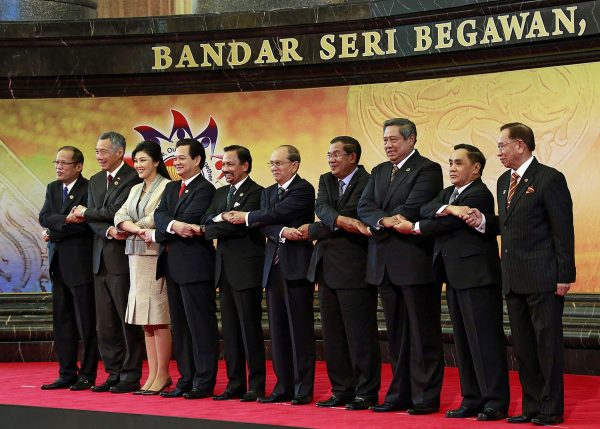The major opposition party, PDI-P — base of the Soekarnoist nationalists including Soekarno’s daughter, former president Megawati Sukarnoputri — came out ahead in the polls with Joko Widodo (widely known as Jokowi) as the lead candidate for the Indonesian presidency. The stage has been set for the presidential election in July, and it’s Jokowi’s to lose.
There were some surprises though. It appears at this stage that PDI-P has gained just under 19 per cent of the vote. The opinion polls were projecting that PDI-P might get between 21 to 24 per cent a week out from polling day. So there was noticeable disappointment and some recriminations within the PDI-P camp. The setback is important. Direct presidential nomination requires 20 per cent of seats in the parliament or 25 per cent of the vote, so Jokowi will need to form a coalition to take the next step.
PDI-P will try to align with the PKB (National Awakening Party) and PAN (the National Mandate Party). They are linked to the two largest moderate Islamic organisations, Nahdlatul Ulama and Muhammadiyah respectively. Collectively the vote for the Islamic parties is estimated to have risen from 26 per cent in 2009 to 32 per cent this election. A coalition with these two parties would position the ‘secular-nationalist’ PDI-P with the pluralist Muslim centre. But a coalition of the PDI-P with these smallish parties will not allow it to form a stable majority-government, despite their strong performance in the legislative election. For that, PDI-P will need the support of one of the medium-sized parties — Gerindra (Greater Indonesia Movement Party), Golkar or the Democratic Party. And that’s when Jokowi will need to learn how to play with the sharks. Golkar, led by Aburizal Bakrie, took around 15 per cent of the vote, not far behind Jokowi, and Prabowo Subianto’s Gerinda party had close to 12 per cent. The vote for President Susilo Bambang Yudhoyono’s Democratic Party was halved to around 10 per cent. Jokowi may, it’s been suggested, try to run a minority government, welding coalition on a case-by-case basis, though that would inject a great deal of uncertainty not only into the political but also the economic environment. There are certainly some sharks still at play in the pool.
But, declares Liam Gammon in this week’s lead on the Indonesian election results:
Make no mistake: Joko Widodo will almost certainly be the next president of Indonesia, notwithstanding PDI-P’s disappointing showing at this election. His closest rival in the presidential race, Prabowo Subianto, is running 30 points behind Jokowi in recent opinion polls. Certainly, the usual caveats about the pitfalls of survey research in Indonesia apply — especially given how much the legislative election results deviated from the surveys. But the truth of the situation is pretty self-evident: Jokowi has a huge lead, and it’s difficult to think of a scenario in which this changes that doesn’t involve a terrible political blunder or scandal.
As Gammon also says, come the inauguration of a Jokowi presidency in October, he will have to deal with political allies-of-convenience not commonly held principle. And they may not share his preoccupation with responding to public demands for greater social spending and attacking the corruption built into state budgets. Whatever the final coloration of the government, Jokowi may yet prove that it is possible in Indonesia to succeed politically from relatively humble origins and without recourse to corruption or manipulation.
The continued success of democratic transition in Indonesia is good news for the region and the world. Despite some disappointments with the Yudhoyono presidency, it saw Indonesia emerge on the world stage as a strong economy and with a confidence that restored coherence and direction to ASEAN’s regional centrality.
What can be expected of the new Indonesian presidency is still to unfold. Maintaining the momentum of strong economic growth and the entrenchment of social change will require bold new strategies. There is a worry that Indonesia might retreat from the challenge. Indonesia’s Southeast Asian neighbours look to Indonesian leadership to bed down the ASEAN Economic Community and East Asian regional initiatives in 2015. If Australia is hoping for a get out of jail free card with the new presidency, it had better think again. Australia is on the nose because of very bad calls by the Australian leadership on the Indonesian spying scandal and unjustifiable and offensive maritime border incursions. This is potentially a serious long-term problem that is not going to change unless fences are mended very publicly. For starters, Australia’s Prime Minister, Tony Abbott, should be the first world leader to line up to pay respects to Indonesia’s outgoing president and take a humble seat at celebrating the inauguration of its next in October.
…and the Thais that bind
Meanwhile in Thailand, the political situation goes from bad to worse. The decision by Thailand’s Constitutional Court to nullify the 2 February elections, as Thitinan Pongsudhirak points out this week, ‘has put the country on a collision course between those who advocate electoral democracy, even at the cost of corruption, and others who are bent on unelected rule based on what they see as virtuous moral authority’.
Prime Minister Yingluck’s days now do seem to be numbered. This looks like it will be the third time in recent history that a democratically elected government has been overthrown by the establishment. If what comes after her is a government that includes both sides of the divide, Thailand may be able to find a way through. But if it is a partisan anti-Thaksin interim government, in which Yingluck’s Pheu Thai Party is excluded from participation, there will be more turmoil and fractured politics which will sooner rather than later also begin to break the economy.
Peter Drysdale is Editor of the East Asia Forum.

